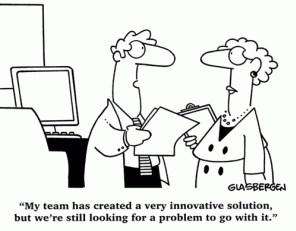Unsustainable Business Models: They Skip the “Search” Phase
In this blog post on Strategyzer, Nabila Amarsy outlines the 3 essential requirements to make a business venture successful:
- The Right Value Proposition
- The Right Business Model
- Flawless Execution
This might seem like common sense, but Amarsy goes on to define what she calls the “search” phase of developing a business idea and how its absence lies at the root of many unsuccessful business ventures. The “search” phase takes place in conjunction with the first 2 requirements outlined above, and basically means “producing market evidence that an idea is going to work”. This phase can be viewed as a loop (refer to the picture above) that occurs until enough research, prototyping, and testing has been done to conclude that the idea will work. Skipping the “search” phase is referred to as premature scaling, and Amarsy claims it can kill any business. Flawless execution can then only be successfully achieved after appropriately exiting the “search” phase.
What do you guys think about this? Should Christenson (and others) have included this in his article “Reinventing the Business Model”? Do you think many people just assume their idea is great because they themselves (and maybe a select inner grouping of people) think so? And what of the companies that skip this phase but are still successful (such as large corporations that invest heavily in R&D, which Amarsy points out is not synonymous with “searching”)? Are they just lucky? And how much time should be invested into the “search” phase? Finally, this idea is very appropriate for our capstone project. How many teams think they successfully conducted a “search” phase that enabled them to conclude their idea was worth pursuing?
————————————————————————————————————————————————————
“We’re a classic MBA case study in how not to introduce a product. First we created a marvelous technological achievement. Then we asked how to make money on it.”
–Iridium Interim CEO John A. Richardson, August 1999
Top 5 Risks for IT Projects
I found this article where the author lists what he believes to be the top 5 risks for IT projects. They are as follows:
1. Other projects getting prioritized over yours, thus taking funding away.
2. Project delays due to infrastructure/system upgrades.
3. Requirement changes/ updates to scope that mean additional work.
4. Project dates can be pushed due to an impact analysis that reveals additional issues/work to be done.
5. Coding can take longer than expected, as initial estimates may be wrong.
The author also mentions how critical it is to identify risks versus organizational issues. For instance, a lack of capabilities on the organizations part may lead to risks, though they are not risks themselves.
Do you think his list covers everything or are there more project risks that he hasn’t mentioned? Which risk would you say is the greatest?
Youtube 360 Degree Videos

http://gizmodo.com/youtubes-ready-to-blow-your-mind-with-360-degree-videos-1690989402
Youtube has released the option to post 360 degree videos. On the browser you click and drag and can look around the person filming and on the phone you move you’re phone to see the whole area. There are some issues right now but they claim it will be fixed soon. For example you have to use a python script to make it actually work in your browser. I think this is a great sustaining innovation though, because they have been doing flat videos for over 10 years. There are not a lot of consumer cameras that can shoot in 360 degrees thought.
What do you think of this? Do you think people will use it with the python necessary? What about without it?
The Five Marketing Must-Haves of an Online Startup

In our first meeting with our mentor, he expressed serious concerns regarding our marketing strategy. This was because we didn’t have one. Each of us may have had some sense of how we wanted to market the application, but there wasn’t a clear direction.
This Entrepreneur article provides five marketing tips for a startup.
1. Focus on customer experience
This means designing a simple application that is easy to use. No matter how good an application is, if people have difficulty using it, they won’t.
2. Cross promotions/exposure
Know your target demographic. Where do they usually hang out (online or offline)? Promote your products at these places.
3. Content strategies
“Establish your brand as a subject-matter expert.”
4. Build virality into your product/experience
How can you get people to share your startup naturally?
5. Media exposure
If you can’t get top-tier media exposure, getting blogs to write about you is a good start.
This is in no way a comprehensive list. Do you agree or disagree with these points? Are there tips that you would consider more valuable than the ones listed above?
Performance Reviews: Self-Evaluation?

In this Forbes article, the author lists the 10 biggest mistakes bosses make in performance reviews. Instead of re-listing all of them here, I’ll allow everyone to read the article for themselves. Upon review of the article, and judging by other posts on this blog about performance reviews, I think we can all agree that there is a lot of frustration out there in the corporate world and flaws being made in regards to performance reviews. There are a lot of opinions on what constitutes a good or bad review, or a good assessment system, but all of this controversy got me thinking: why don’t employees just evaluate themselves?
Instead of having a boss review your performance over the last quarter/year/whenever and trusting they are aware of all you have contributed, what do you guys think about employees assessing themselves and pointing out how they have benefited the company in the context of their specific role and what is expected of them, but also pointing out areas for improvement? Obviously an employee is not going to want to give themselves a bad review, so maybe there could be a hybrid system where an employee strictly points out a list of contributions that a supervisor/boss may have forgotten about or overlooked, and leave the negatives to the supervisor.
This is just a thought, but one I have not heard of or come across in our discussion of this topic in our class. Do you guys think this could be a viable alternative? Have any of you heard of this before in the real world? If so, has it worked? Is it successful? Would this work in our class, or would that be a bad idea?
Entrepreneurial Success through Mentorship

In researching mentorship in the startup culture, I located a Forbes magazine article entitled “Why Entrepreneurs Need Good Mentors.” According to the author, a key benefit of having an accessible and knowledgeable mentor is that he or she can help you make good decisions more quickly; particularly in a startup situation, it is better to make a good decision sooner rather than a perfect decision later.
In addition to accessibility which permits prompt feedback, a good mentor should have “expert-level” experience, preferably as an entrepreneur, as well as a “direct yet supportive” feedback style. This latter point relates to our discussion in class about what makes a strong performance review: it is important that performance issues, whether of an employee or of an entrepreneur, be identified so that corrective action can be taken, but it is also important to make criticisms constructive. It is just as valuable to point out strengths as it is to point out weaknesses.
With the author’s points in mind, how do you feel your meetings with your mentor will guide your project’s direction? Also, what connections can you draw between your mentor’s experiences and your project?
Performance Reviews: Why Bother?

This article regarding performance reviews says that reviews a few times a year are meaningless. It states that company performance reviews should be like that of sports teams, immediate feedback as opposed to every quarter as was discussed in class. While quarterly reviews are better than annual reviews, too much time will have passed when quarterly reviews are given. The feedback to employees should be immediate so that they can modify their behavior so as not to waste company resources.
It goes on to say that the purpose of the performance review isn’t for the benefit of the employee, but rather for the company. In many cases, it provides written documentation of your failings so that if need be, they can fire you and cite the poor reviews as the reasoning. Even HR managers dislike performance reviews as shown by a 2010 Sibson Consulting study where 58% of managers disliked their own review systems.
While the article states that performance reviews are meaningless, it advocates the need for immediate feedback which is a less formal type of performance review. Do you think this model is better than what most companies have in place now? Or should companies do both, informal immediate feedback coupled with formal quarterly reviews?
Laziness and First Impressions: Barriers to Integrative Thinking

In this article, author Michael Michalko argues that cognitive laziness is one of the greatest barriers to integrative thinking. He points out that first impressions of problems, just like first impressions of people, are narrow and superficial. If this mentality is never changed, it prevents alternative ways of looking at the problem, meaning that integrative thinking will never surface. To remove any biases or assumptions resulting from a first impression, Michalko recommended taking Leonardo DaVinci’s advice: always look at a problem in at least three different ways in order to get a better understanding; or Sigmund Freud: “reframe” a problem in order to transform it and look at it from a different perspective.
This suggests patience. Unfortunately, laziness is inherently the result of impatience.
Thus, cognitive laziness becomes a barrier to entry, the entry point being integrative thinking. In order to gain a deeper understanding of a problem at hand, particularly in a business context, how does one motivate oneself or others in order to get rid of cognitive laziness? Getting rid of biases/assumptions is easier said than done. How would you go about this to achieve integrative thinking? Any thoughts?
How to Ace Your Performance Review
I know that I personally have always thought of performance reviews as uncomfortable sit-downs with the boss where I get talked at for a while, with little back and forth. I never thought that I had to play an active part in a review that was being conducted of me. However, the author of this Forbes article disagrees. She believes that one of the key aspects of a performance review should be you providing your own self-evaluation to your boss. Below are the steps that she says everyone should take to “ace their performance review.”
1. Don’t get overly emotional. It’s easy to take things personally, but try to keep things in perspective.
2. Prepare a self-evaluation throughout the year. Note all of your accomplishments and major contributions, as your boss is too busy to make note of every time you do something good.
3. Tell your boss where you need more support- this is also your chance to review your department.
4. Spell out your goals for the coming year. This will help you in next years review, as you can measure up against these goals.
5. Speak in plain English and avoid business jargon.
6. Handle criticism openly.
While most of the above are points that we have discussed, the self-evaluation concept is a new one. What are your thoughts on detailing all of your accomplishments throughout the year and listing them out to your boss? What’s the best way to go about t
A Real Rival to Cable TV…For a Price
PlayStation Vue Review: A Real Rival to Cable TV…For a Price – WSJ
Sony presents PlayStation Vue that allow the uses to stream live TV and DVR in the cloud. It is hard to really determine where Sony was going with this new idea seeing how it can touch so many companies and markets.
What market do you see this disruption falling under? Why?
With the price being so high I do not see how it would be able to push TiVo out of the picture, but it is the first real internet service to threaten cable TV. Vue allows you to also DVR to the cloud which means no more worrying about running out of storage. Pretty awesome innovation, and will be interested to see how PlayStation hones in on the application, price, and easy of use.






Recent Comments